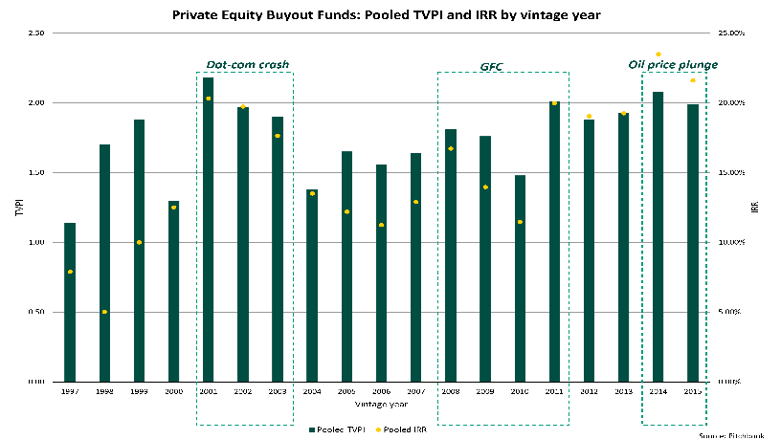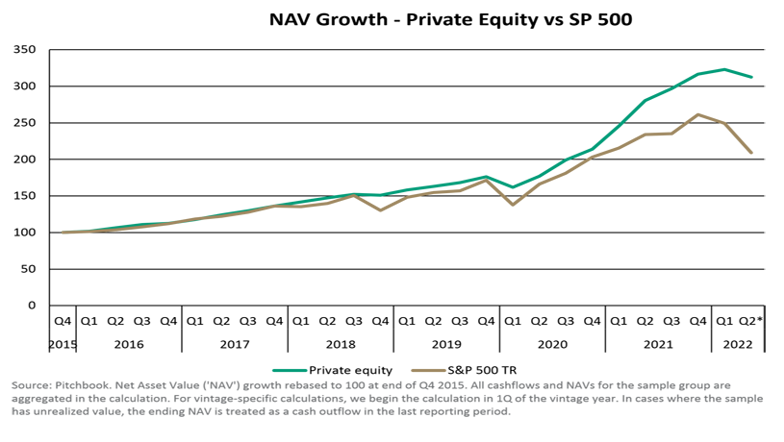In the current market environment, it can be difficult to decide where and when to invest for growth. We have undertaken analysis of historic data to see how private equity has performed in similar market conditions to those displayed currently and compared that to public markets.
Our findings show that private equity funds are capable of delivering superior returns in times of market stress. In fact, the very best performance is typically achieved by those funds which begin investing during a downturn and the immediate aftermath. Private equity can also provide less volatility than public markets and display more resilience.
Investors may find this useful information when deciding upon their allocations to different asset classes.
Private equity funds can deliver superior returns in times of market stress.
The chart below shows the total value to paid in multiple (TVPI) and the internal rate of return or 'IRR' for private equity buyout funds which commenced investing between 1997-2015.
 Source: Pitchbook
Source: Pitchbook
The highest returning funds are for 'crisis-era' vintages, i.e. those invested during economic downturns (or the immediate aftermath), such as the Dotcom bubble of the early 2000s, the global financial crisis (GFC) in 2008, or the oil price plunge in 2014.
Conversely, over the same periods, public markets suffered initial declines in response to market shocks, which was then followed by benign performance.
 Volatility considerations
Volatility considerations
As we've seen above, private equity has demonstrated its ability to perform strongly in times of stress. But what about the volatility of the returns?
If we look at the results of our own analysis, by comparing the net asset values of the S&P500 and a private equity index (both rebased to 100 as at Q4 2015), we again see the outperformance of private equity over the public market. What is also evident is the reduced volatility of private equity, with performance declining less than the public market equivalent in times of market 'shock'. 
Why is now a good time to consider private equity investment?
There are several key factors underpinning private equity's ability to perform in economic downturns and as to how it can outperform public markets.
Long-term patient capital
Fundamentally, private equity’s ‘committed capital’ more easily allows for decisions and investment to be made based on value creation over the medium term, without needing to have regard to managing near term earnings for share price management. It also allows for a stable shareholder and decision-making framework, which is not assured as a public company, and freedom from public market regulatory obligations and costs which can be restrictive.
Active management and value creation
Depending on the deal type, private equity investors are able to exercise varying levels of control over portfolio companies. Professional investors are able to assist companies by sharing their experience of other companies they have invested in, helping them develop new capabilities and to grow in new ways. Dedicated 'value creation' teams will employ a playbook to support companies to grow. This could be through acquisition, entering new geographies, launching new products, people change or digital transformation.
Attractive pricing
Market dislocation creates opportunities. When fundamentally strong companies become temporarily undervalued the pricing becomes more attractive. Private investors actively seek these opportunities and can benefit as valuations recover. It's easier to sell high when you've bought low and as patient investors, private equity can take a long term view and sell when the best conditions present themselves.
Insight summary
- Historic data shows that private equity has performed strongly when its investment period commences in economic downturns producing strong vintage returns.
Private equity valuations are less volatile than public markets, and are more resilient in periods of stress with additional benefits arising from capital remaining invested. - The inherent characteristics of private equity (patient capital, active management, focus on value creation) underpin its ability to perform in economic downturns and outperform public markets.
- Please remember that past performance is not an indicator of future performance. Investments in private equity are high risk and speculative which means there is no guarantee of returns and investors should not invest unless they are prepared to lose all of their money. This type of investment is illiquid so can’t be easily accessed until the exit point. Investors are unlikely to be protected if something goes wrong.